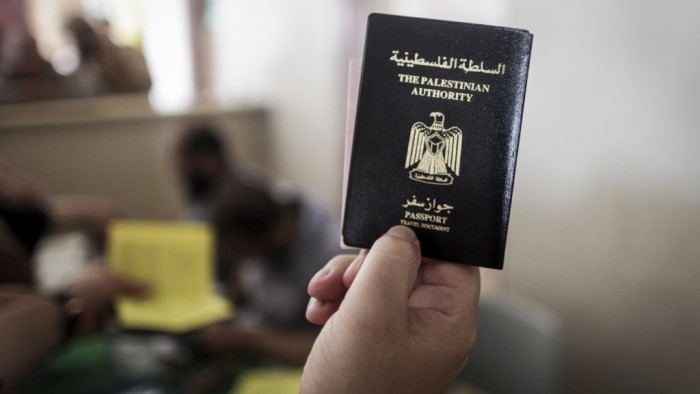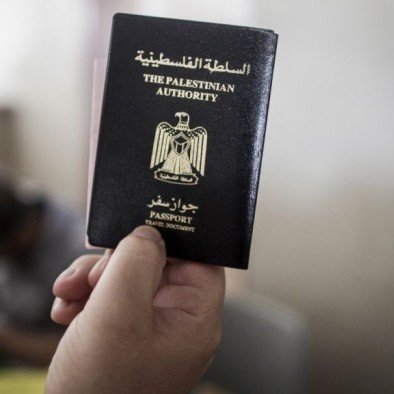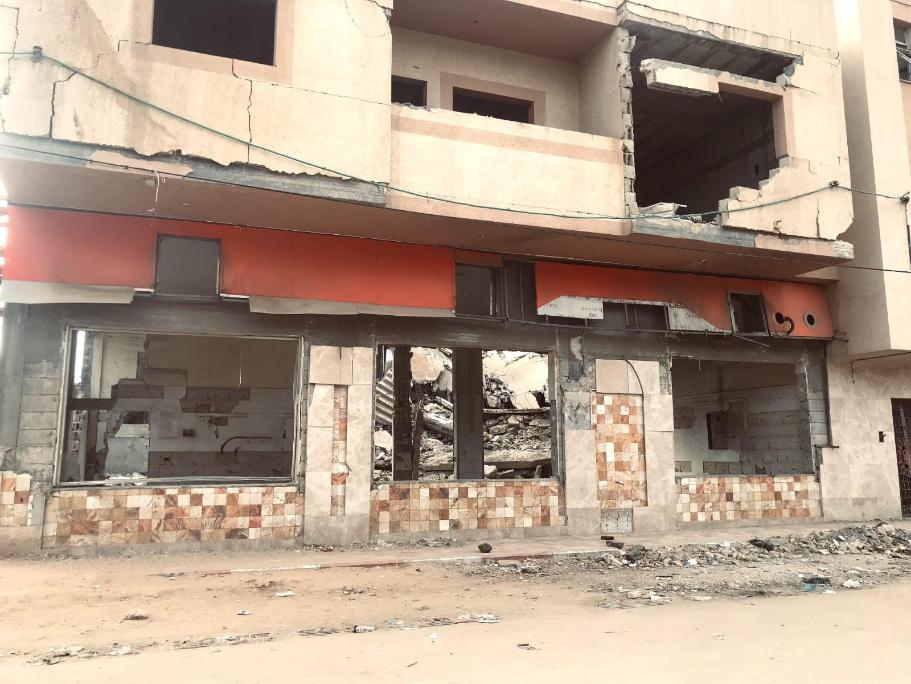
For over a decade, Israel and Egypt have prevented Palestinians from exiting Gaza by tightly controlling the only two crossings out of the besieged strip. Palestinians now say that another barrier they face in traveling abroad is from the Palestinian Authority (PA), which governs the West Bank and has implemented a quiet policy to deny travel documents requested by those it suspects have connections to Hamas, its arch rival and the ruling party in Gaza. The PA is the only authority that can issue this vital document for Palestinians, including those in Gaza.
Bakr al-Turkmani from the Gaza office of the International Commission for Human Rights (ICHR), a quasi-governmental organization, said his group has monitored passport denials since 2007. From 2007 through 2016, it recorded 90 complaints of refused or ignored passport requests. Since 2017, however, that rate has soared, with 50 more complaints received. Applicants typically are told denials are for “security reasons.”
According to al-Turkmani, most requests for passports that are ignored or refused are seemingly tied to a perceived connection with political factions. A direct connection is not necessary; denials also can be triggered by the affiliation of a first-degree family member. Thus, say Palestinians in Gaza, passport denials have become a form of collective punishment.
"The refusal is due to political issues, like being affiliated with any parties opposing the PA,” al-Turkmani concluded. “Like there are women, daughters, sons, relatives or friends for whom the PA refuses to issue passports just because someone close to them has a connection with an opposing party. The PA is violating Palestinian law, which grants all Palestinians the right to move freely.”
A divisive history
The Palestinian government began issuing passports in 1995 following the signing of the Oslo Accords, although only those included in a population registry maintained by Israel are eligible to apply for the document. Article 20 of the 2003 Amended Palestinian Basic Law states that "freedom of residence and movement shall be guaranteed within the limits of the law." Article 11 further states that “It is unlawful to arrest, search, imprison, restrict the freedom or prevent the movement of any person, except by judicial order in accordance with the provisions of the law.”

In 2006, Hamas won a majority of parliamentary seats in a democratic election. Urged on by the United States and Israel, the Fatah-controlled Palestinian Authority opposed inclusion of Hamas in the government. In 2007, governance of the Palestinian people split in two, with Hamas managing Gaza and the Palestinian Authority in charge of the West Bank. The dispute was (and continues to be) violent and bitter.
Until 2007, Palestinians could apply in Gaza for travel documents. But that year, the population registry and passport oversight were transferred to the West Bank, forcing Palestinians in Gaza to rely on “travel agencies” to courier their document requests to Ramallah.
“Unfortunately, what is going on is a consequence of the current division between the Palestinians, and Palestinian citizens seem to be the victim,” a spokesperson for the Minisry of Interior in Gaza, Ihab al-Ghussein, told the Electronic Intifada in 2010. “Most of those deprived of passports include students or patients.”
During the last two years, the PA imposed sanctions on Gazans, limiting resources at a time when the World Bank already noted the economy was in “free-fall.” It is within this period that complaints to ICHR nearly doubled, although there is no comprehensive database of all passport denials.

The case of Rushdi Sarraj
Refusals to replace passports have dire consequences. Consider the case of Rushdi Yehia al-Sarraj, 27, who says his passport was lost in May 2018 when he was in the process of applying for a visa to Turkey to attend a media conference in Istanbul. There is no Turkish representative office in Gaza, so al-Sarraj used a courier service and sent his passport to the consulate in Jerusalem.
“I was chosen to attend the conference and receive an award for one of our documentaries,” al-Sarraj says. The film is about the efforts of an ambitious Palestinian girl who wants to leave Gaza to attend graduate school abroad.
Somewhere between Gaza and the appropriate officials in the consulate, his passport disappeared. Al-Sarraj contacted the Turkish consulate but officials there said they didn’t know anything about his document. Meanwhile, the travel agency he used to send his request to Ramallah insist it was received by the consulate.
Al-Sarraj then applied for a passport replacement. Al-Sarraj called and emailed officials in the PA and notified the Gaza Passport Department of his predicament. He also contacted Huda Salama, chief of the Gaza Passport Department, via Facebook. She simply informed him that issuing a replacement “takes time.” He appealed to the ICHR for help, and al-Turkmani says the commission was told in August 2018 that Surraj’s request had been refused by the PA for unspecified “security reasons.”
Al-Sarraj is co-founder of Ain Media with Yaser Murtaja, a photojournalist who killed by Israeli forces during the weekly Great March of Return protest in April 2018. At the time of Murtaja’s death, the company had 12 employees and produced works for international organizations like Interpol, UNDP, UNICEF and UNRWA. Some of their clients included television networks such as Al Jazeera and the BBC. In 2018, Ain Media won a grant from USAID, meaning it was vetted by the U.S. State Department.
“Yaser and I became friends because we live in the same Gaza City neighborhood,” al-Sarraj explained. “We founded Ain Media in 2012, two years before I graduated from university. After Yaser’s death, we were in shock and for a while, our energy to work in the company declined. But we’ve decided to stand on our feet despite the pain. We wanted to please Yaser by working to achieve our shared dream.”
Another media professional, sports photographer Alaa Shamaly, 33, is in the same situation. In 2014, his home was bombed by the Israel military, destroying it and all of the family’s belongings—including his passport. Shamaly first applied for a replacement passport at the end of 2014, but he said he did not get a response from the PA.
Since then, Shamalay has missed a significant opportunity to work abroad in Qatar as a sports journalist, as well as to attend three conferences in Morocco, Bahrain and Pakistan.

Pressure campaigns work
Another Palestinian who was initially denied a replacement passport was more fortunate. His denial was later reversed, without explanation, after a pressure campaign was launched by supporters.
Ahmed Alnaouq, 25, is the original project manager for We Are Not Numbers. In 2018, he traveled to Egypt and settled in Cairo for six months. After his six-month residency permit ended, he went to the passport department to extend his status and was detained. It turned out that the person who had issued his residency permit had forged it.
Alnaouq was confined in prison for about one month and then was deported to Gaza without his passport. Alnaouq requested a replacement passport to allow him to travel to several conferences on behalf of We Are Not Numbers, as well as to study in the UK as a recipient of the prestigious Chevening Scholarship. He received no reply and was advised several times by insiders that his case was “hopeless.” Alnaouq’s brother was a member of Hamas and was killed in the 2014 war on Gaza by Israeli forces, leaving him to speculate that this association had caused his denial. Through his We Are Not Numbers connections and Chevening supporters, he was able to orchestrate a barrage of phone calls, emails and social media posts to lobby for his case. Nine months later, his passport was issued. Days before classes started, Alnaouq was allowed to travel. He currently is studying journalism at the University of Leeds and represents We Are Not Numbers in Europe.
“So many internationals intervened for me,” he says now. “Most Gazans don’t have that; I was extremely fortunate.”
A list of questions was sent to the Government Media Center in the Palestinian prime minister’s office for comment. The agency did not reply.
First published in modified form by Mondoweiss.











